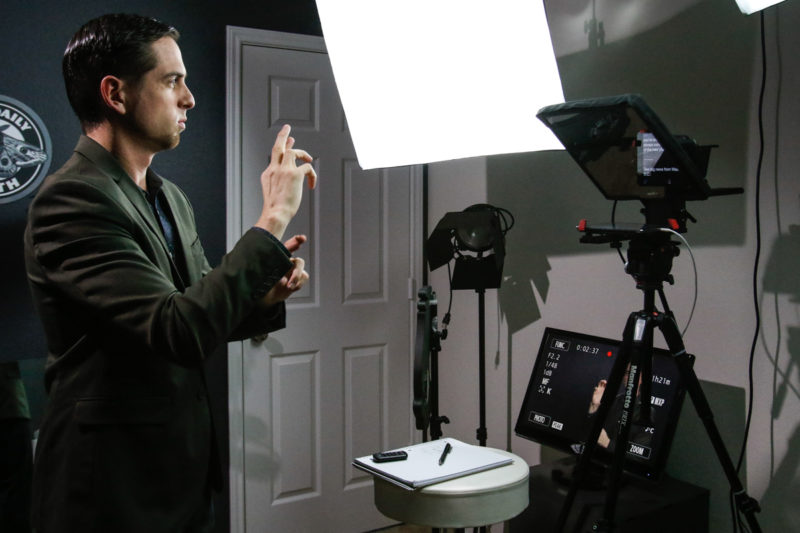Sign Language Is the Big Draw for an Online News Program for Deaf People
By Danielle Smith
Reporting Texas

Alex Abenchuchan follows his teleprompter as he signs the news for his online audience. Targeted at the deaf, his video broadcast has more than 93,000 Facebook followers. Denise Cathey/Reporting Texas
BUDA — Alex Abenchuchan, 30, is a deaf journalist who founded the Daily Moth, an online video news broadcast in American Sign Language that he produces and anchors himself from his home in this town south of Austin.
There are more than 350,000 people with a hearing disability in Texas, making up 2.3 percent of the population, according to the Gallaudet University estimates based on the 2014 federal census.
The Daily Moth started with a trial run in summer 2014. The show now has more than 93,000 followers on Facebook and is adding an average 1,500 followers a week, Abenchuchan said.
Monday through Thursday, Abenchuchan gathers news from other outlets and does some reporting himself before putting together the day’s script. He produces the program from a spare bedroom in his house.
The Moth is delivered primarily through Facebook, with daily videos linked from the Moth’s YouTube channel. Abenchuchan also has an email list of over 5,000 subscribers who receive the video reports in their inbox Monday through Thursday.
“The point is equivalent accessibility to the news in ASL,” Abenchuchan said in an interview. “I want to provide the same concept of the radio, but in ASL so that the deaf community can sit back and consume the news rather than read it.”
Abenchuchan, who pursues the Moth full-time, spoke in ASL through an interpreter. His GoFundMe site has raised more than $26,000. Austin-based Convo Relay, a deaf-owned company whose products provide ASL access through smartphones and computers, recently became a sponsor of the site. The company is providing equipment and reporting resources to the Moth.
“We just think his work and his goals are so important because we see so many of our community members saying they can finally follow and be interested in the news by Alex doing what he’s doing, said Leila Hanaumi, 27, the brand director at Convo. “He has changed that almost overnight.”
Among the Moth’s fans is Al Noll, a software engineer at IBM who is deaf. During his 33 years at the company, Noll pioneered on-site interpreting services.
“I am amazed at Alex’s intensity when it comes to top stories and the current events. He summarizes so well and makes the information clearly understood by any native ASL signer or anyone who knows ASL,” said Noll.
Jeremy Weston, 32, a hearing person who is an ASL interpreter for Travis County, said he watches the Moth regularly.
“I enjoy watching the news in sign language, which Alex provides,” he said. “Austin, in my opinion, is one of the top deaf cities. I feel like it is a mecca here. It’s just a very rich, a vibrant community.”
Kent Turner, 29, a middle school teacher at the Texas School for the Deaf in Austin, uses the Moth as an educational tool.
“Students love the Daily Moth because they are able to gather data in their own native language. They are more knowledgeable about current events, and their curiosity is piqued more frequently than not,” said Turner, who shows the Daily Moth every morning in his classroom.
Abenchuchan said he named his show the Daily Moth because it relates to the deaf experience.
“Deaf people usually gather together under the light because they need to be able to see the signs. So deaf people are like moths, and I feel like if I stop [the show], then the light burns out,” Abenchuchan said.
This article has been corrected. Software engineer Al Noll pioneered on-site, not online, interpreting services.